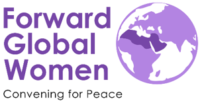 Post by Karen Feste, American participant
Post by Karen Feste, American participant
The Berlin conference was a source of inspiration and understanding. First, it was truly inspiring to feel the vibrant energy among this group of highly talented women activists, all leaders in their countries, dedicated to fostering advancement of civil society–to realize that individually, each participant makes positive contributions in their homeland, and that collectively, our group may be able to achieve some progress in the pursuit of peacemaking.
Simultaneously, the meetings offered a rich experiential learning environment in the small, intimate open forum setting. Questions and comments raised by members of this exclusive group seemed honest and forthright, revealing different, indeed, contradictory, and even antagonistic perspectives about why conflict persists in the Middle East; the flow of discussion presented a kind of barometer of current tensions across the region.
Third, out of this twofold enlightened setting, I felt both sad and humbled. Sad that prospects for peace in the immediate future seem dim due to domestic and international instability affecting people lives over this geographic space and yet humbled by the massive efforts experts have devoted to negotiate peaceful solutions.
Lastly, these meetings served as a call-to-action. Women are not running the world: most presidents, prime ministers, and foreign ministers among nearly 200 UN-member states are male. Security Council Resolution 1325, although nearly 15 years old, remains current and important as a document for increasing the role of women in conflict prevention and conflict resolution decision-making to help improve life on earth.
